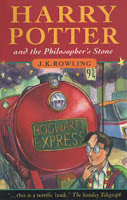Genre: Fantasy
Rating: B
I’m not really sure that I can do an unbiased review of the first Harry Potter novel. At the same time, however, I’m not really
sure if I’m required to be unbiased, this being my blog and not a scholarly
source of any sorts. At this point in my
life, reading Harry Potter and the
Philosopher’s Stone is like reuniting with an old friend; life may have
changed a lot since I first met Harry and Hogwarts, but going back to this book
always takes me back to the first time I read it – when I was less worldly,
less jaded, and less critical. As such, it’s
hard to critique this book.
Philosopher’s Stone introduces
us to the world of magic and all that it entails. In many ways it’s a complete story while in
many other ways it’s merely a small piece of a much greater puzzle – an
important piece, but a small one. For
those of you who aren’t familiar with the book itself or the franchise as a
whole (I’m assuming that there are a few of you still out there) Philosopher’s Stone is about a young
boy, Harry Potter, who had believed that he was an unremarkable boy until his
eleventh birthday. As a baby he was sent
to live with his aunt and uncle, the Dursleys, after his parents died in a
horrific accident – it’s revealed early on to the readers that the Potters’
deaths was the result of some remarkable event, but Harry’s non-magic relatives
told him only that they died in a car crash, hoping to hide his heritage from
him and as a result make him grow up ‘normal’.
All this changes on his eleventh birthday when Rubeus Hagrid shows up
and announces to Harry that he’s a wizard and has a spot at the magical school
Hogwarts. From here the story is as much
about Harry’s first year in the magical world itself, and all the traditional
friend- and enemy-making that such an occurrence entails, as it is about the
more sinister elements that threaten Harry’s new world and the titular
philosopher’s stone.
In many ways, Philosopher’s
Stone is both remarkably slow and remarkably fast in its pace. There’s never a point when I feel bored by
the story or hoping that it would just get to the point – at the same time, however,
I’ve read this book so many times that the cover is falling off, the pages are
all nicely creased, and I spend half of it quoting lines that are coming up – but
it isn’t until a good portion of the book is done that you actually find out
about the sinister elements, the philosopher’s stone and what not. For the most part, Philosopher’s Stone is set up and little anecdotal incidents that
don’t really appear to pertain to any greater plot – at least not right
away. While this style works well in the
larger books in the series – it’s easy to spend a hundred pages setting the
story up when a novel is eight hundred pages long, but less so when the novel’s
only two hundred pages – it doesn’t work as well in Philosopher’s Stone. I’m not
saying that the book needed to be longer or really changed in any way – it’s
awesome and I love it – I’m just saying that it takes a lot to get beyond the
anecdotes and to the greater threat.
Despite this slowness, though, the anecdotes and little incidents that
transpire throughout Philosopher’s Stone
are absolutely intriguing. I love the
way Rowling weaves together the real world and one that’s merely a figment of
her – and our – imagination, as well as the way that she writes a
multidimensional novel. On the one hand Philosopher’s Stone (and most of the
other books in the series) is a relatively light read. At some two hundred pages it’s a book that
can easily be consumed in one sitting.
At the same time, however, there’s an underlying current in these
books. You don’t see it as readily on
your first read of Philosopher’s Stone
as you can in the later novels, but the story is an intricate web and things
that Rowling makes a brief mention of in Philosopher’s
Stone pop up in much greater significance later on. In addition to this, Philosopher’s Stone is a tribute to the greater work of
literature. You can tell that Rowling is
a well read women not simply because of the skill with which she writes but
because of the many allusions to other writings that she makes. While the books are children’s fantasy
novels, they also contain elements of mystery, adventure, thriller, and romance
novels (although less romantic in this one than in others), and they show signs
of having been inspired by many other great works. In addition, they allude to real life events,
acting as a parallel to many things that plague the real world. One of the things that really bothers me
about fantasy authors is when they don’t appear to have read fantasy novels
before writing their own works in the genre, but you never get this sense with
Rowling. From the moment that you pick
up Harry Potter and the Philosopher’s
Stone to when you put down Harry
Potter Deathly Hallows you can tell that Rowling is well read in a plethora
of genres, including fantasy.


No comments:
Post a Comment